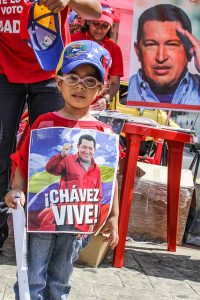
As troops leave the military in droves, Nicolas Maduro appears to be losing his grip on the presidency in Venezuela. Presiding over a long running national crisis, Maduro remains in power nearly a year after an election that much of his political opposition, the United States, and many U.S. allies deemed fraudulent. Much of Maduro’s opposition claims the presidency should go to his political rival, Juan Guaidó. Possible intervention of the United States remains on the table, and there is a long history of U.S. intervention in the nation, which, if it happens again, could garner more support for Maduro.
As Guaidó now calls for national protest against Maduro, top military generals and a significant portion of Venezuelans, the chavistas remain at the president’s side. A recent article in The Nation by sociologists Tim Gill and Rebecca Hanson argues Guaidó should attend to the plights of chavistas — historic backers of Maduro’s far-left predecessor Hugo Chávez –for any presidential transition to be successful.
Gill argues that Guaidó’s initial rise was due in part to the U.S. influence on student movements that Guaidó was a part of meant to rid Chávez of his office, and enable the U.S. to retain a foothold in political and economic matters in Venezuela. Guaidó’s association with the United States comes at a price.
Hanson’s decade-long work with Venezuelans in Caracas suggests that even though many have continued to oppose Maduro, “some would prefer that [Guaidó] ‘put his house in order’ without outside intervention—that he demonstrate his ability to generate support within Venezuela.”
Whether it is Guaidó or Maduro in power, many Venezuelans believe that their country will be under the service of the United States or Russia and China, respectively.
Gill and Hanson argue that Guaidó should instead attend more to his own people — such as offering free healthcare and the protection of human rights — which would serve the poor and working class through and after his transition into power. They also state this strategy should include aligning himself with former president, Hugo Chávez and his followers, the chavistas. Chávez remains a political icon beyond his death due to his legacy as an advocate for the poor and his outspokenness against American intervention in Venezuela. To these ends, Gill and Hanson conclude:
“There is no political future in Venezuela without chavista participation, and, one way or another, the opposition and chavismo will eventually need to work together toward a new future.”

Comments 2
yahoo casino slot games — March 8, 2019
Lower RAM (Random Entry Memory) could be the trigger of Warcraft three crash.
Especially the casino bonuses can be as high as $1000.
This also enhances the ability to play the online games without spending the investment. http://www.xn--herzrhythmusstrungen-hbc.biz/goto.php?site=Lpe88.life%2Findex.php%2Fother-games%2Fplay8oy
Rodolfo Marchesi — September 23, 2023
Gli Stati Uniti hanno imposto sanzioni economiche contro una serie di funzionari e organizzazioni venezuelane e hanno anche imposto sanzioni all'industria petrolifera del Venezuela, esercitando una notevole pressione sull'economia del paese. La migliore distrazione da questioni simili è giocare online ai giochi d'azzardo. C'è un ottimo sito con un ampio elenco di casinò verificati e informazioni su bonus senza deposito non AAMS. Consiglio a tutti di dare un'occhiata se stanno pensando a quale casinò scegliere per giocare.